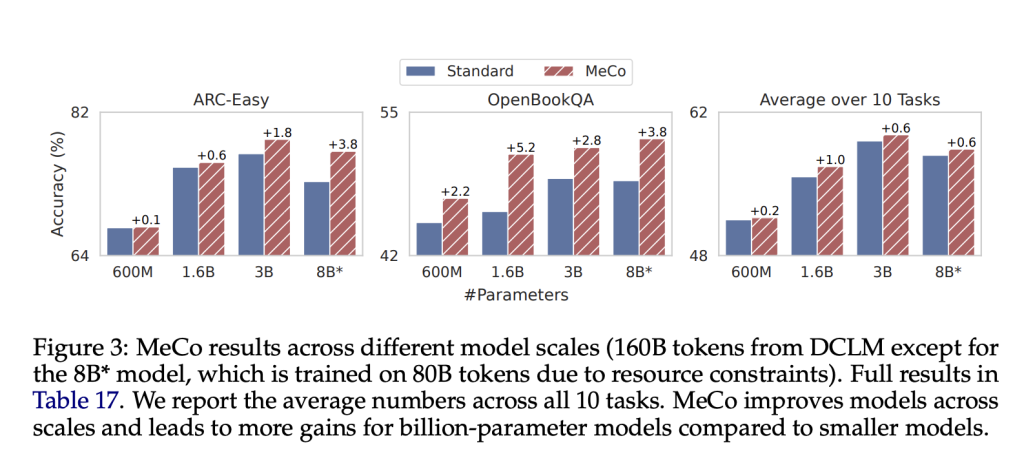

The pre-training of language models (LMs) plays a crucial role in enabling their ability to understand and generate text. However, a significant challenge lies in effectively leveraging the diversity of training corpora, which often include data from varied sources such as Wikipedia, blogs, and social media. Models typically treat all input data equivalently, disregarding contextual cues about the source or style. This approach has two primary shortcomings:
- Missed Contextual Signals: Without considering metadata such as source URLs, LMs overlook important contextual information that could guide their understanding of a text’s intent or quality.
- Inefficiency in Specialized Tasks: Treating heterogeneous data uniformly can reduce the model’s efficiency in handling tasks that require specific stylistic or factual knowledge.
These issues result in a less robust training process, higher computational costs, and suboptimal downstream task performance. Addressing these inefficiencies is essential for developing more effective and versatile language models.
Researchers from Princeton University have introduced Metadata Conditioning then Cooldown (MeCo) to address the challenges of standard pre-training. MeCo leverages readily available metadata, such as source URLs, during the pre-training phase. By prepending this metadata to the input text, the method enables the model to better associate documents with their contextual information.
MeCo operates in two stages:
- Metadata Conditioning (First 90%): During the initial phase, metadata such as “URL: wikipedia.org” is prepended to the document. The model learns to recognize the relationship between metadata and document content.
- Cooldown Phase (Last 10%): In this phase, training continues without metadata to ensure the model can generalize to scenarios where metadata is unavailable during inference.
This straightforward approach not only accelerates pre-training but also enhances the flexibility of language models, allowing them to adapt to various tasks or contexts with minimal additional effort.

Technical Details and Benefits of MeCo
Core Mechanism:
- MeCo appends metadata, such as domain names, to the input text in the training data. For example, a Wikipedia article on Tim Cook would include the prefix “URL: wikipedia.org”.
- The training objective remains unchanged; the model predicts the next token based on the combined metadata and document text.
Advantages:
- Improved Data Efficiency: MeCo reduces the amount of training data required. For instance, a 1.6B parameter model trained with MeCo achieves the same downstream performance as standard pre-training while using 33% less data.
- Enhanced Model Adaptability: Conditioning the inference on specific metadata enables models trained with MeCo to produce outputs with desired attributes, such as higher factuality or reduced toxicity.
- Minimal Overhead: Unlike computationally intensive methods such as data filtering, MeCo introduces almost no additional complexity or cost.


Results and Insights
Performance Gains: The researchers evaluated MeCo across various model scales (600M to 8B parameters) and datasets (C4, RefinedWeb, and DCLM). Key findings include:
- MeCo consistently outperformed standard pre-training in downstream tasks, such as question answering and commonsense reasoning.
- For a 1.6B model trained on the DCLM dataset, MeCo achieved an average performance improvement of 1.0% across 10 tasks compared to standard methods.
Data Efficiency: MeCo’s ability to achieve equivalent results with 33% less data translates to substantial savings in computational resources. This efficiency is particularly valuable in large-scale training scenarios.
Conditional Inference: The method also supports “conditional inference,” where prepending specific metadata (e.g., “factquizmaster.com”) to a prompt can guide the model’s behavior. For example:
- Using “wikipedia.org” reduced the toxicity of generated outputs.
- Prepending synthetic URLs improved performance on tasks like common knowledge question answering.
Ablation Studies: Experiments demonstrated that MeCo’s benefits stem primarily from its ability to group documents by metadata rather than the specific semantic content of the metadata. This suggests that even hashed or synthetic metadata can enhance training efficiency.
Conclusion
The Metadata Conditioning then Cooldown (MeCo) method is a practical and effective approach to optimizing language model pre-training. By leveraging metadata, MeCo addresses inefficiencies in standard pre-training, reducing data requirements and improving both performance and adaptability. Its simplicity and minimal computational overhead make it an appealing option for researchers and practitioners developing robust and efficient language models.
As natural language processing evolves, techniques like MeCo highlight the value of using metadata to refine training processes. Future research could explore integrating MeCo with other innovative approaches, such as domain-specific tuning or dynamic metadata generation, to further enhance its effectiveness.
Check out the Paper. All credit for this research goes to the researchers of this project. Also, don’t forget to follow us on Twitter and join our Telegram Channel and LinkedIn Group. Don’t Forget to join our 60k+ ML SubReddit.
 FREE UPCOMING AI WEBINAR (JAN 15, 2025): Boost LLM Accuracy with Synthetic Data and Evaluation Intelligence–Join this webinar to gain actionable insights into boosting LLM model performance and accuracy while safeguarding data privacy.
FREE UPCOMING AI WEBINAR (JAN 15, 2025): Boost LLM Accuracy with Synthetic Data and Evaluation Intelligence–Join this webinar to gain actionable insights into boosting LLM model performance and accuracy while safeguarding data privacy.
The post Researchers from Princeton University Introduce Metadata Conditioning then Cooldown (MeCo) to Simplify and Optimize Language Model Pre-training appeared first on MarkTechPost.
Source: Read MoreÂ



